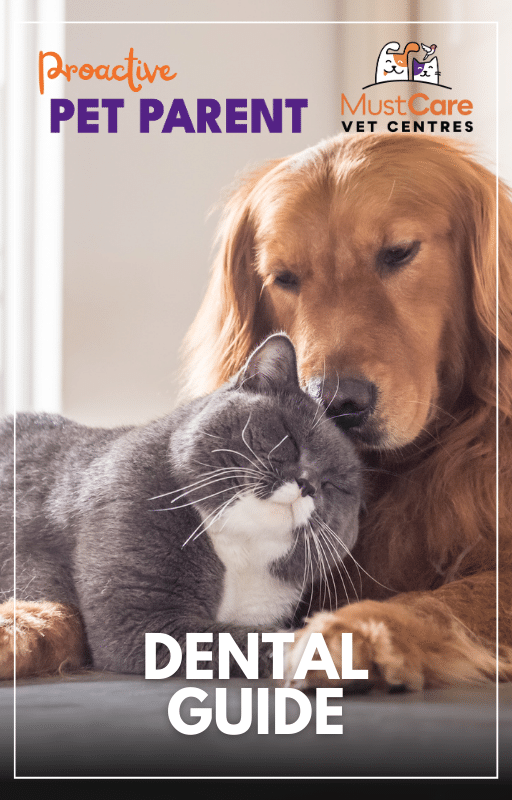Share This Blog With Other Pet Parents!
Knowing When to Visit the Vet: A Guide for Pet Owners
Do you ever find yourself wondering when it’s truly necessary to take your pet to the vet? As a pet parent, recognizing the signs that indicate a vet visit is crucial for ensuring your furry friend’s well-being. In this article, we’ll delve into the key indicators that signal it’s time to seek veterinary care for your pet. By understanding these signs and knowing when to act, you can provide the best possible care for your pet and address any health issues promptly. Whether you’re a seasoned pet owner or new to the responsibilities of caring for a furry companion, knowing when to visit the vet is essential for maintaining your pet’s health and happiness. Here’s a helpful guide.
What you’ll learn from this blog:

For all you need to know, download our
FREE Dental Guide
This blog is part of our Proactive Pet Parent series! This is just the beginning… To see more blogs, click here! Better yet, sign-up to our newsletter to receive these directly to your inbox each month.
Sign-up To The Proactive Pet Parent Newsletter
Understanding Normal Pet Behaviour
Pets, much like humans, exhibit a wide range of behaviours that are considered normal within their species. These behaviours can vary depending on factors such as breed, age, and individual personality. For example, dogs may engage in activities like barking, chewing, or wagging their tails, while cats may display behaviours such as purring, kneading, or grooming themselves. Understanding what constitutes normal behaviour for your pet is essential for identifying any changes or abnormalities that may indicate underlying health issues.
As a responsible pet parent, being observant and familiar with your pet’s typical behaviours enables you to notice subtle changes that could signal a need for veterinary attention. Recognising normal behaviours helps foster a deeper bond between you and your pet, as you become attuned to their unique personality and communication cues. By gaining insight into what is considered normal for your pet, you can better respond to their needs and provide appropriate care and support. Ultimately, understanding normal pet behaviour serves as a foundation for proactive pet care and promotes overall well-being.
Physical Symptoms to Watch For
In addition to understanding normal pet behaviour, it’s crucial to be vigilant for any physical symptoms that may indicate potential health problems. While some changes in behaviour can be subtle, physical symptoms are often more evident and may require immediate attention.
Common physical symptoms to watch for include:
- Changes in appetite or water consumption
- Lethargy or excessive sleepiness
- Coughing or difficulty breathing
- Vomiting or diarrhoea
- Limping or difficulty moving
- Changes in weight or body condition
- Blood in the urine, stool, or any other part of the body
These signs can be indicative of various health issues, ranging from minor ailments to more serious conditions requiring urgent veterinary care.
Regularly monitoring your pet’s physical well-being allows you to detect any abnormalities early on, increasing the likelihood of successful treatment and recovery. Additionally, understanding the significance of these physical symptoms empowers you to make informed decisions regarding your pet’s healthcare, including when to seek veterinary assistance.
Behavioural Changes
In addition to physical symptoms, it’s essential to pay attention to any behavioural changes in your pet. Pets often communicate discomfort or distress through changes in their behaviour, which may manifest as increased aggression, hiding or withdrawal, excessive vocalisation, restlessness, or changes in litter box habits for cats.
For dogs, behavioural changes may include increased irritability, reluctance to play or exercise, excessive licking or chewing, or changes in appetite. These behavioural changes can be indicative of underlying health issues, stress, anxiety, or even environmental changes that may be affecting your pet’s well-being. While some behavioural changes may be temporary and resolve on their own, persistent or concerning behaviours warrant further investigation by a veterinarian.
Age-Related Considerations
As pets age, they may experience a variety of age-related changes that require special attention and care. Just like humans, pets are susceptible to conditions such as arthritis, dental disease, cognitive decline, and organ dysfunction as they grow older.
Arthritis, for example, can cause stiffness, pain, and decreased mobility in senior pets, making it essential to provide them with comfortable bedding and gentle exercise tailored to their needs. Dental disease, if left untreated, can lead to pain, difficulty eating, and even systemic health issues, highlighting the importance of regular dental check-ups and professional cleanings for senior pets.
Cognitive decline, also known as cognitive dysfunction syndrome (CDS), can manifest as confusion, disorientation, changes in sleep patterns, and altered behaviour in older pets. While there is no cure for CDS, certain interventions, such as environmental enrichment and specialised diets, can help manage the symptoms and improve your pet’s quality of life.
Additionally, as pets age, their organs may become less efficient, requiring adjustments in diet, medication, and overall management to support their health and well-being. By understanding and addressing these age-related considerations, you can better meet the evolving needs of your senior pet and ensure their golden years are comfortable, enjoyable, and filled with love and care.
Environmental Factors
The environment in which your pet lives plays a crucial role in their overall health and well-being. Factors such as temperature, humidity, air quality, and exposure to toxins can all impact your pet’s health and behaviour. For example, extreme temperatures can pose risks to pets, especially those with respiratory issues or thick fur coats. It’s essential to provide adequate shelter and access to fresh water and shade during hot weather and ensure warmth and protection from the cold during winter months.
Additionally, indoor air quality can affect pets, particularly those with sensitivities to dust, pollen, or household chemicals. Keeping your home clean and well-ventilated can help minimise respiratory issues and allergies in your pets. Exposure to toxins such as household cleaners, pesticides, and certain plants can be harmful to pets if ingested or inhaled.
Regular Check-ups and Preventive Care
Regular veterinary check-ups are essential for maintaining your pet’s health and catching any potential issues early on. During these appointments, your veterinarian will conduct a thorough physical examination, checking your pet’s overall condition, weight, and vital signs. They may also recommend preventive measures such as vaccinations, parasite control, and dental care to help keep your pet healthy and protected against common diseases and conditions. Preventive care is especially crucial for senior pets, as they may be more susceptible to age-related health issues.
Additionally, these check-ups provide an opportunity for you to discuss any questions or concerns you may have about your pet’s health and behaviour. By staying proactive and scheduling regular check-ups with your veterinarian, you can help ensure that your pet receives the care they need to live a long, happy, and healthy life. Regular preventive care not only saves you money in the long run by avoiding costly treatments for preventable conditions but also ensures that your pet receives the best possible care throughout their life.
We’ve covered a lot of ground in this article, from understanding normal pet behaviour to recognising potential red flags and the importance of preventive care. However, there’s always more to learn and explore when it comes to pet health and wellness. If you have any questions or concerns about your pet’s health, don’t hesitate to reach out to us at MustCare Vets. We’re here to help guide you and provide the best care possible for your furry friends. We hope this article has been informative and helpful in empowering you to take charge of your pet’s health.

